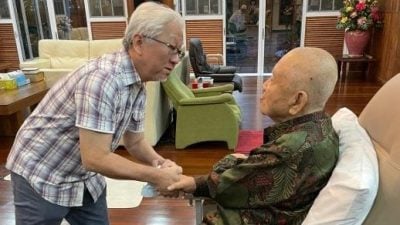Sin Chew Daily
No doubt, we are all Malaysians of Chinese ancestry. While we take pride in such an identity, we are definitely not Chinese nationals. We were born and raised here, and will most likely die here, too, some day. As such, we have never the least doubted our being Malaysian citizens, and we don't need any politician to keep reminding us of that.
As long as we are Malaysians, there should not be any differentiation along racial lines. Save for a handful of unscrupulous politicians, no one in the right mind would believe this country belongs to only a single ethnic group or a political alliance.
Our leaders and representatives today have all been voted democratically, and therefore anyone that wins will get to rule. If the competition is fair and square, it will be gladly accepted by all Malaysians, and there is no such thing as the Malays or the Chinese being the masters of this land.
Owing to the country's historical background, for decades Umno, MCA and MIC representing their respective communities have formed a ruling coalition. This has nothing to do with "chauvinism". This is history, the way the nation's founding fathers built up this country with their wisdom so as to keep Malaysia peaceful and stable.
But for the past two days, as the country's largest opposition party, DAP has misinterpreted its own assemblyman Ronnie Liu's call of "not diluting the party's Chineseness" as "Chinese chauvinism", thus entrenching the conflicts and squabbles already existent within the party.
Liu's speech at the launch of party veteran Liew Ah Kim's new book last week could be summed up in two main points: not to dilute the party's "Chineseness", and to cooperate with Malay parties so long as its dignity is not compromised.
The remark has since sparked open debates among party leaders across the generational divide.
Among them the more cautiously worded like Lim Kit Siang: "DAP does not advocate any de-Chinese, de-Malay policy… first and foremost we are all Malaysians," and Anthony Loke: "The view expressed by Liu did not represent DAP at large, only personal view based on his own perception."
The statements made by these two leaders were inconclusive, leaving ample room for further dialogues and communication among party members with differing views.
Others have been more aggressive, such as Tony Phua: "Ronnie Liu is the Chinese chauvinist that DAP does not need," asserting that Liu's Chineseness strategy would set the party back for decades and was "perhaps the biggest insult one could throw at DAP". He also claimed that MCA had 'Chineseness-ed' themselves into oblivion and that DAP must rid itself of the "Chinese chauvinist" tag.
If Phua's statement could represent DAP's, then we could draw the following conclusions:
1. DAP tolerates no dissident views;
2. Defending Chineseness constitutes the biggest insult for DAP; and
3. De-Chineseness is essential for the party to stay in power.

So, de-Chineseness could help DAP win the support of non-Chinese voters? Such belief has oversimplified Malaysian politics and grossly underestimated the wisdom of our non-Chinese compatriots, and would most definitely not strike a chord among the Malays, that the rationale of diluting the party's Chineseness is to secure the support of the Malays.
As for the Chinese, they will feel that DAP is being ungrateful having clinched their electoral support in past elections.
Such a strategy will never reverse the stereotyped impression among the Malays towards the party, but will instead offend Chinese swing voters, and more likely than not, end up nowhere.
MCA may not be a star performer in politics, and this should indeed serve as an invaluable lesson for DAP not to repeat the mistakes and dutifully does its part as a responsible opposition party, lest it falls back into MCA's predicament.
Looking back at the 2018 general elections, to be fair MCA's lackluster performance could be largely blamed on corruption of the previous BN administration, not because of DAP's exemplary policies per se. Without a lift from Tun Mahathir, the party may not get to repeat the glory of 95% Chinese votes come the next election!
Being serious in mapping out governing policies comes way more important than vainly manipulating political tactics to down a rival. Politicians, no matter how influential they might get, will have to bow out some day, when all the fames and glories will come to a decisive close.
As such, political parties should strive to promote greater harmony in multicultural Malaysia for more sustained prosperity and peace, instead of fighting for more powers and gains. While in power they should rule with dignity and respect and when no more in power, shoulder the responsibility of checking the sitting government.
ADVERTISEMENT
ADVERTISEMENT


































